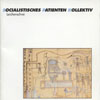SPK, "Leichenschrei"
 Lauded often as the zenith of their career, this album manages to be richer and more unified by actually being more disjointed: rather than the nine distinct pieces that made up Information Overload Unit, Leichenschrei is 14 shorter tracks that bleed over into one another, often invisibly. Taken as a whole there is a certain thematic linkage that pulls the album together into one of darkest, bleakest ones in existence, one that loses none of its power nearly 30 years since its release.
Lauded often as the zenith of their career, this album manages to be richer and more unified by actually being more disjointed: rather than the nine distinct pieces that made up Information Overload Unit, Leichenschrei is 14 shorter tracks that bleed over into one another, often invisibly. Taken as a whole there is a certain thematic linkage that pulls the album together into one of darkest, bleakest ones in existence, one that loses none of its power nearly 30 years since its release.
Thermidor/Side Effects/Mute
The most obvious differentiating factor between this and the previous Information Overload Unit is less of a reliance on raw, harsh noise strategies.While dissonance is still the norm here, it is placed within a more structured, rhythmic framework that feels more focused overall.While there is little hint of the more conventional, commercial tone their work would take afterwards, there is more form here for sure.
Rhythms—acoustic, electronic, and metallic—drive most of these songs, along with a more open use of analog synthesizers and sequencers.Rather than burying them in layer upon layer of distortion and effects, they're allowed to sound as they were intended in most circumstances.While it bears only the slightest hints of the synth pop rhythms that dominated their later work, there are some memorable patterns to be heard, much different than Information Overload Unit.
Another distinct feature are that the vocals, rather than being either harshly barked in German or obscured in effects, are instead more of a spoken word type, often rather clear and performed by either Graeme Revell, the late Neil Hill, or Sinan Leong (Revell's wife, who I think made Machine Age Voodoo worse than it could have been, but here is an acceptable presence), and are thematically either related to autopsies or sex.Very few albums feature lines as memorable as "…he tried to give me syphilis by wiping his cock on my sandwich," but it's here on "Post-Mortem."
Looking at the album in its original vinyl arrangement, the second half features more "songs" in my opinion: longer pieces that feel more fleshed out and structured, while the first half are shorter sketches that are more experimental overall."Despair" is the most conventional song here. It works with a repetitive bass guitar/junk percussion rhythm section, focused synthesizer work, and Revell ALMOST singing the lyrics.In a way, it almost heralds the transition of "industrial" from its early, experimental days when this album was recorded to the aggressive, synth driven dance music "industrial" became.
"Day of Pigs" comes in a close second for musical structure, with noisy electronics and muted vocals, propelled by bass guitar and a beautifully stiff analog drum machine.Structurally it adheres to traditional song conventions rather well, stopping and starting in all the right places.The repetitive synth sequence and erratic rhythms of "Wars of Islam" carry some additional early proto-techno/electro sensibilities to it:while sinister and messy, it’s not hard to hear how it structurally fits into both of those genres quite well with its tight sequences and repetitive rhythms and melodic synth lead towards the end.
One exception to the song orientation on this side is "The Agony of the Plasma," which pairs spoken word and muted musical elements with repeated loops of a woman’s scream and breaking glass, only feeling less like a sonic collage and more like an actual "song" in its closing minute.Its skeletal structure makes it perhaps the most formless piece on the album, and while it lacks in cohesion, it makes up for it in mood.
There are precious few albums that can present this level of violence and menace without coming across as cliché or forced, and I honestly can’t think of one that does it as well as Leichenschrei.Oozing with pure malice, it is also a timeless album that, if released today, would be considered just as brilliant as it was in 1982.I've personally owned this for over a decade and listening to it again for purposes of this review, it still felt fresh, with nuances I never noticed before being apparent.I suppose it was inevitable that SPK took such a nosedive in their career afterward, because I don’t think it would have been possible to top this album or create something even similar.It's a beautifully disturbing album that sounds or feels like nothing else.
samples:
 



